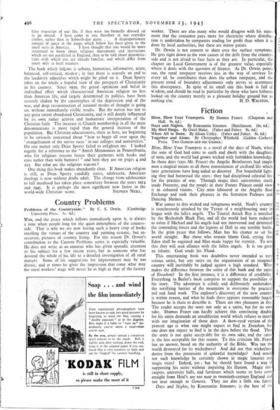Country Problems
WAR, and the peace which follows immediately upon it, is always a time when people long for the quiet atmosphere of the country- side. That is why we are now having such a heavy crop of books extolling the virtues of the country and painting ecstatic, but in- accurate, pictures of country living. For this reason Dr. Orwin's contribution to the Current Problems series is especially valuable. He does not write as an amateur who has given sporadic attention to his subject for a few recent years, but as someone who has devoted the whole of his life to a detailed investigation of all rural matters. Some of his suggestions for improvement may be too drastic, and at times he gives the impression that come what may the rural workers' wage will never be as high as that of the factory
worker. There are also many who would disagree with his state- ment that the consumer pays more for electricity where distribu- tion is undertaken by companies trading for profit than when it is done by local authorities, but these are minor points.
Dr. Orwin is not content to skate over the surface symptoms. He gets right down to the root causes of the drift from the country- side and is not afraid to face facts as they are. In particular, the chapter on Local Government is of the greatest value, especially where it deals with the question of finance. As Dr. Orwin points out, the rural ratepayer receives less in the way of services for every id. he contributes than does the urban ratepayer, and the present trend of boundary adjustments only serves to accentuate this discrepancy. In spite of its small size this book is full of wisdom, and should be read in particular by those who have hitherto looked on the country merely as a pleasant holiday ground but as
a
rr,
T


























 Previous page
Previous page